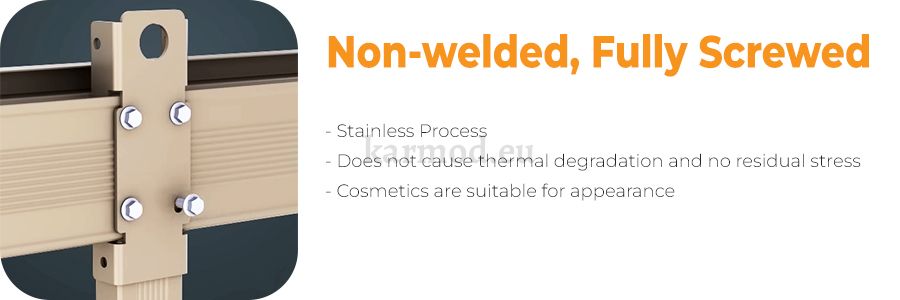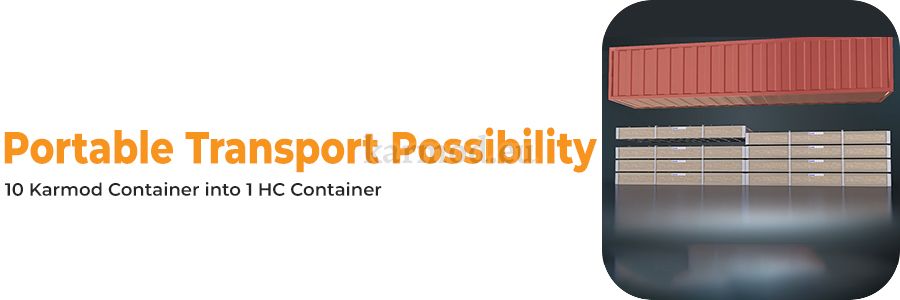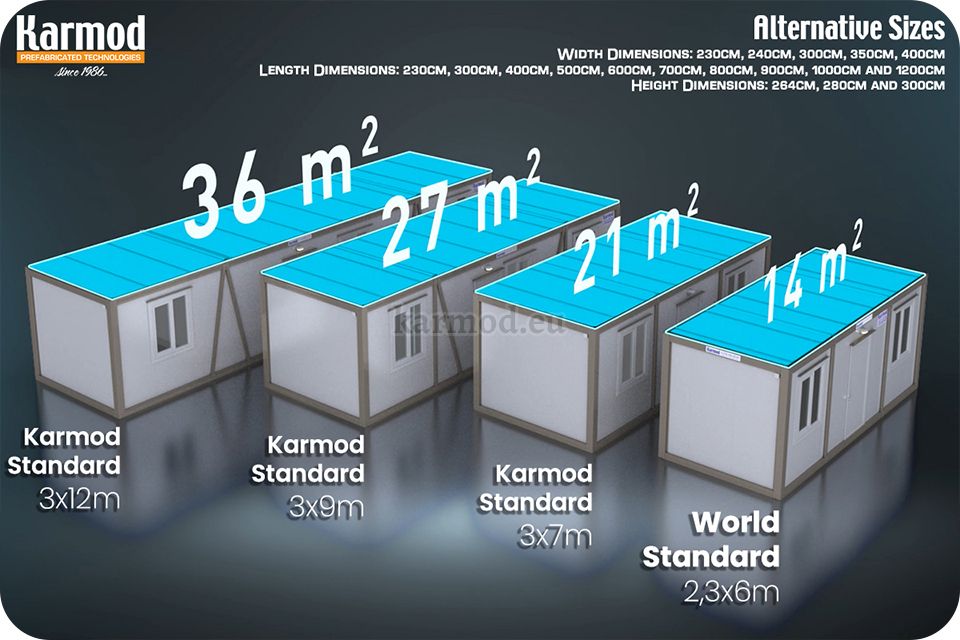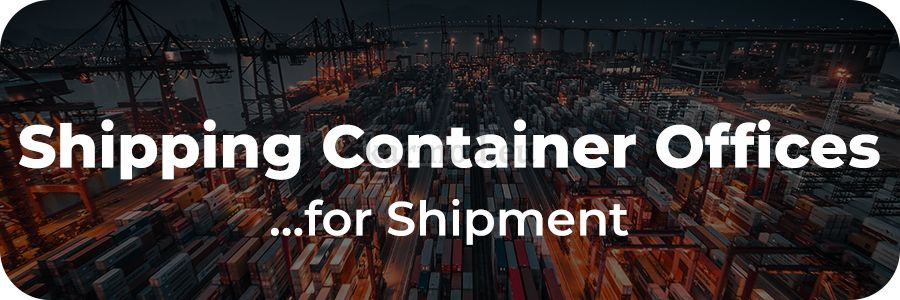Container Office Prices
Container offices are a practical, cost-effective, and modern solution for businesses requiring additional workspaces. Whether it's a start-up looking for an affordable office or an established company needing temporary space during a refurbishment, the container office is a perfect solution. It is not only practical but also provides a unique, industrial aesthetic appeal.
Prices for these unique workspace solutions can vary significantly based on a few factors. The primary determinants of a container office's price are its size, condition (new or used), and the level of customization required.

- Size: Similar to containers, container offices come in various standard sizes. The most common are 20-foot and 40-foot models. Naturally, larger offices cost more than their smaller counterparts.
- Condition: New container offices will be more expensive than used or refurbished ones. However, they will have no wear and tear and can often be customized from scratch, suiting your specifications perfectly.
- Customization: This involves the installation of windows, doors, insulation, electrical systems, interior finishing, and other amenities. More extensive customization or high-end finishes will increase the final cost.
Another crucial consideration is the inclusion of additional units, such as a container toilet, which would increase the overall cost but add to the convenience of your container office space.
As an alternative, a modular office is an excellent choice for businesses needing more extensive or long-term space. These are constructed using similar principles as container offices but offer greater flexibility in size, layout, and design. However, these are typically more expensive due to their larger size and complexity.
Container Office Design
The design of a container office is where the creativity truly shines. Combining the principles of functionality, aesthetics, and sustainability, the container office design leverages the structural strength and convenience of container.

- Prefab office container: This design type comes pre-assembled and requires minimal onsite work. It offers a quick solution for businesses that need an office setup swiftly.
- Modern container office: Incorporating elements of contemporary architecture, a modern container office could feature large windows for natural light, open layouts for flexibility, and eco-friendly materials for sustainability.
- Flat pack container office: This design option is ideal for remote locations. These offices are shipped disassembled and are assembled on-site, saving significant transportation costs.
- Small office container: For businesses that only require a small workspace, a compact container office design could be the perfect solution. Despite their size, these offices can still be equipped with all essential facilities.
- Container garden office: Combining work with nature, a container garden office could be placed within a lush garden setting, offering a peaceful work environment.

Container Office Inside
The inside of a container office is all about comfort, functionality, and productivity. Despite the exterior’s industrial look, the inside container office can be transformed into a warm, inviting workspace.
- Office cabin container: This design style ensures privacy and quiet, essential for businesses that require confidential or undisturbed work.
- Ready-made container office: These come fully fitted with all the necessities of an office environment - desks, chairs, storage, and essential services like electricity and internet.
- Movable container office: These offices are designed for mobility. They come with features like integrated wheels or easy-to-disassemble parts that make relocation a breeze.
- Construction site container office: Essential for any building project, these offices are designed to withstand rough site conditions. They often include space for plans, a small meeting area, and essential facilities for staff.
- Container commercial buildings: These designs can incorporate multiple container units, creating extensive workspaces, including reception areas, meeting rooms, and staff lounges. They're excellent for businesses looking to make a bold architectural statement.

Remember, whether you're looking to buy an office container for sale or opting for a rental, designing your container office should reflect your business's unique needs and identity.
Container Office Images
There's nothing quite like a visual to inspire new ideas, especially when it comes to the innovative world of container offices. Each image reflects the versatility and potential of containers, demonstrating how businesses have adapted them into unique, functional workspaces.
Container Office Plans
Every successful container office project starts with a well-drafted plan. Understanding the following types of office container plans can help businesses make informed decisions.
- Modular office container plans: These blueprints show how multiple containers can be interconnected to create spacious and customizable office spaces.
- Construction site container office plans: These plans focus on durability and functionality, detailing robust build materials and smart space utilization.
- Office cabin container plans: These schematics emphasize privacy and quiet, ideal for professions requiring a secluded work environment.
- Container commercial building plans: These plans showcase the potential to create large-scale commercial spaces using containers, from office buildings to shopping centers.
- Portable container office plans: These diagrams indicate how offices can be designed for easy relocation, often featuring components that facilitate quick disassembly and reassembly.
Container Office Projects
Finally, seeing completed container office projects can provide a wealth of ideas and inspiration.
- Mobile container office projects: These projects demonstrate the benefits of a movable workspace, ideal for businesses requiring frequent relocation.
- Prefab container office projects: These examples highlight the ease and speed of installing a prefabricated office, particularly useful in time-sensitive scenarios.
- Modern container office projects: These showcase how businesses have adopted modern design trends to create attractive, innovative container offices.
- Container office building projects: These project examples demonstrate the scalability of container offices, presenting multi-story and extensive workspace structures.
- Container office for sale projects: By reviewing these projects, prospective buyers can gain an understanding of the market, examining various price points, sizes, and design options available when planning to buy an office container.

Container Office Manufacturing Details
The manufacturing process of a container office involves several key steps and factors, whether it's a prefab office container, modular office container, or a flat pack container office.
- Design: The first step is creating a design plan that caters to the specific needs of the customer. This includes determining the size of the office, the interior layout, and the desired features.
- Construction: Next, the container is prepared. For a prefab container office or a modular office container, this step involves insulating the walls, installing windows and doors, and fitting out the interior based on the design plan.
- Delivery and Assembly: The final step is delivering the container office to the customer's site. A prefab container office can be transported fully assembled, while a flat pack container office is transported in pieces and then assembled on site. For a movable container office, it's designed with easy relocation in mind.

Second Hand and Used Container Office Disadvantages
While used container offices may have lower initial costs, they come with potential disadvantages.
- Wear and Tear: Used containers often have a history of wear and tear that can impact their structural integrity. These containers may require significant repairs and maintenance.
- Lack of Customization: Unlike a ready-made container office or a modern container office, used containers may not have the features you desire and retrofitting them can be costly.
- Limited Lifespan: A used container will likely have a shorter lifespan than a new one, which could affect its long-term cost-effectiveness.

Shipping and Storage Container Office Disadvantages
While shipping containers can make sturdy and unique offices, they aren't without drawbacks.
- Insulation: Shipping containers are made of steel, which isn't a good insulator. Therefore, they often require additional insulation to make them suitable for use as a container office building or an inside container office.
- Space: Shipping containers can be narrow, limiting the layout options for your office cabin container or small office container.
- Legal Issues: In some areas, there may be zoning laws or building codes that regulate the use of shipping containers for commercial purposes, making it more challenging to set up a container commercial building or a mobile container office.






